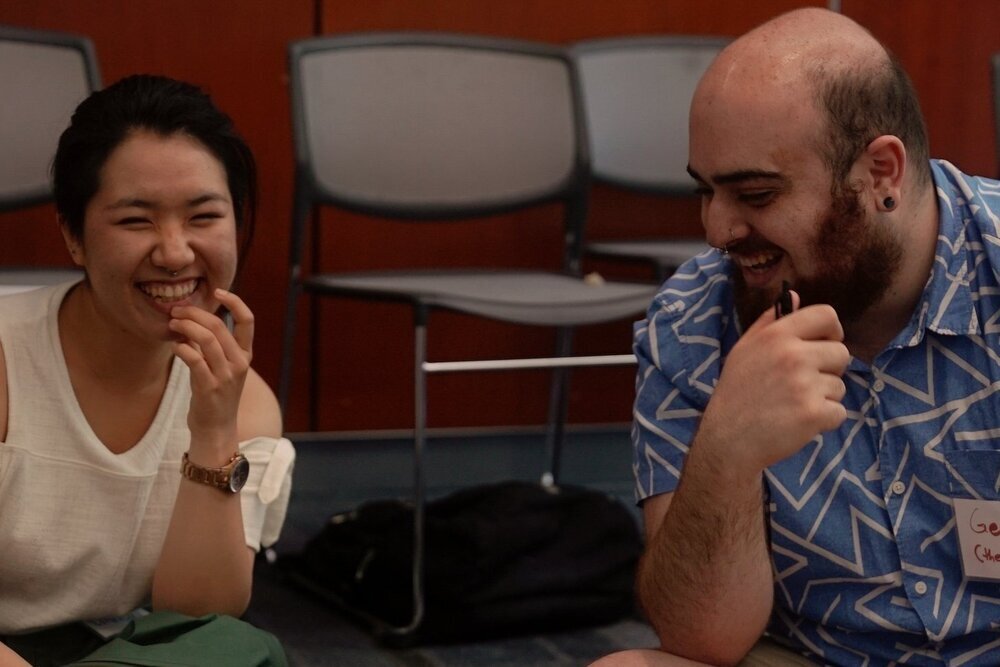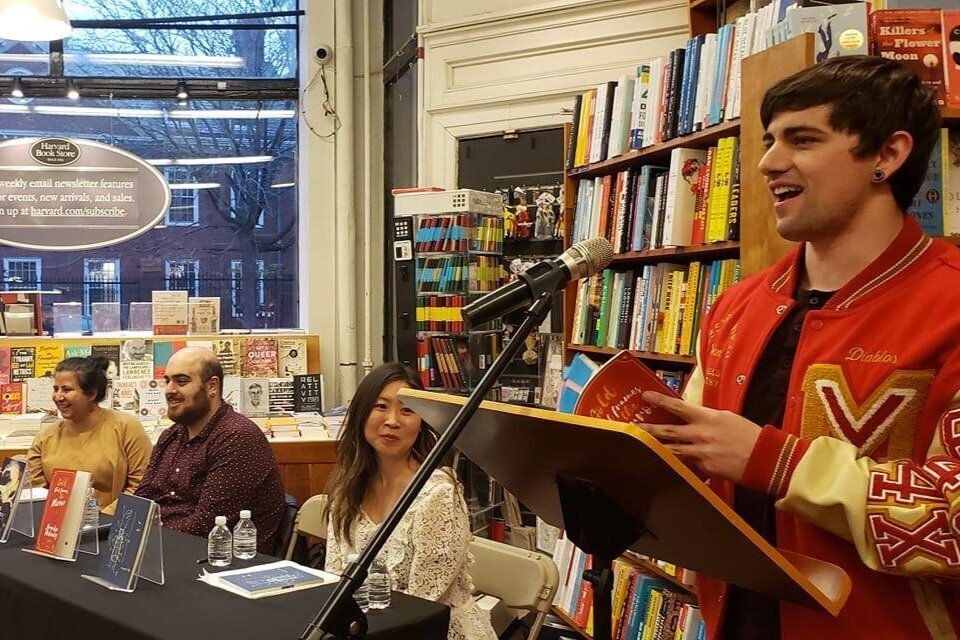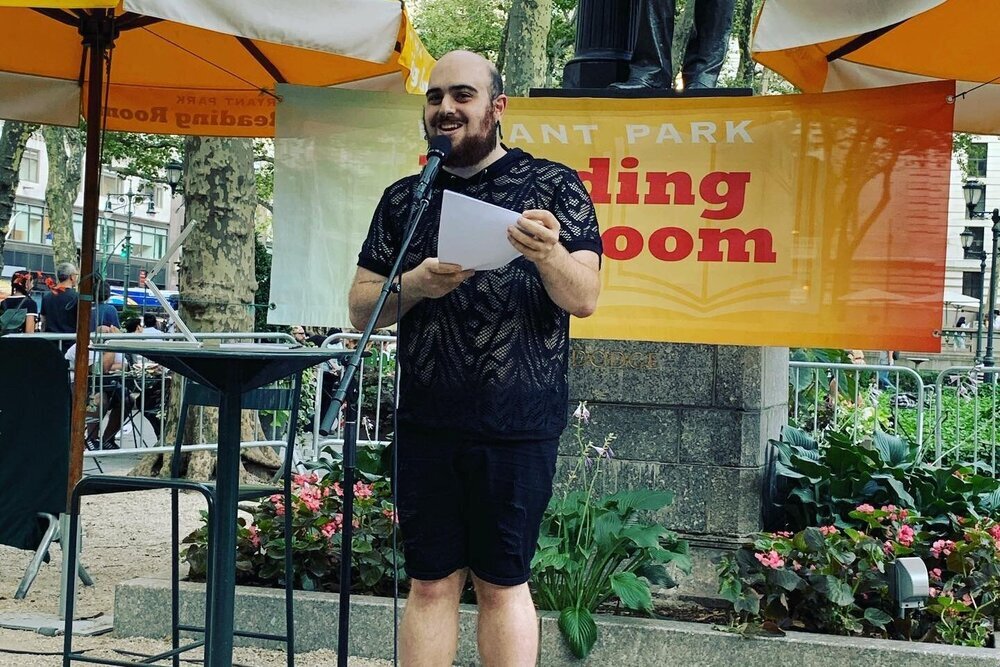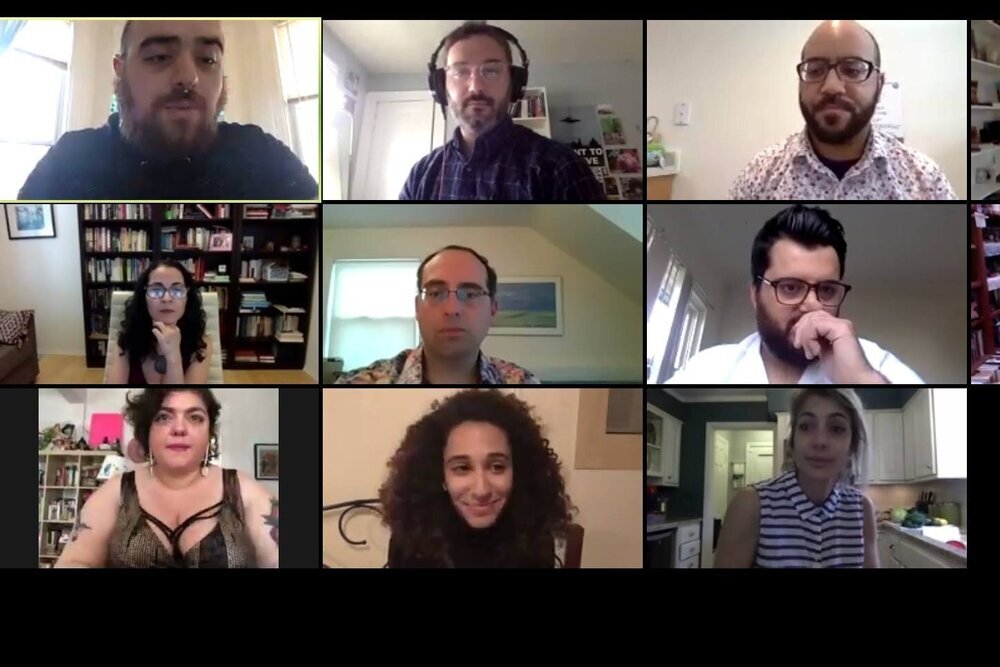George Abraham
George Abraham (they/he/هو) is a Palestinian American poet, performance artist, and writer from Jacksonville, FL. They are the author of When the Arab Apocalypse Comes to America (Haymarket Books, 2026) and Birthright (Button Poetry, 2020), which won the Arab American Book Award and the Big Other Book Award in Poetry, and was a finalist for the Lambda Literary Award in Bisexual Poetry. He is also the author of the chapbooks al youm (The Atlas Review, 2017), and the specimen's apology (Sibling Rivalry Press, 2019). He is a board member for the Radius of Arab American Writers (RAWI), a recipient of fellowships from The Arab American National Museum, The Boston Foundation, the National Performance Network, and the Map Fund, and more. Their writing has appeared in The Nation, The American Poetry Review, The Baffler, The Paris Review, Mizna, and many other journals and anthologies. A graduate of Northwestern University's Litowitz MFA+MA program in Creative Writing, Abraham has taught at Emerson College and Harvard University. He is currently Executive Editor of the Whiting Award winning journal Mizna. Their collaborations include co-editing a Palestinian poetry anthology with Noor Hindi titled HEAVEN LOOKS LIKE US: Palestinian Poetry (Haymarket Books, May 2025), and a performance art project titled EVE with Fargo Tbakhi. Their work has been translated into Arabic, Farsi, Japanese, Portuguese, Spanish, and more. They currently teach at Amherst College as a Writer-in-Residence.
SELECTED PUBLICATIONS:
POETRY: “Searching for a Palestinian After,” The Nation
POETRY: “Taking Back Jerusalem,” World Literature Today
INTERVIEW: “George Abraham vs. Returning,” The VS Podcast
POETRY: “before he was their ‘great poet’” & “Autobiography Of.” The Baffler
POETRY: “Searching for a Palestinian Necropastoral (Eve),” Poem-a-day
POETRY: "To All The Ghosts I've Loved Before,” The Missouri Review
ESSAY: "Imagining a Free Palestine: an Ekphrasis on a Fragmented Nationalism,” The Paris Review
INTERVIEW: “To Remember, Read, & Return - A Conversation with George Abraham and Omar Sakrm,” The Los Angeles Review of Books
works:
Birthright
Button Poetry, 2020
The Specimen’s Apology
Sibling Rivalry Press, 2019
al youm
The Atlas Review, 2017





Topics addressed in readings
Diasporic and non-western notions of queerness
Palestine
Historical and ancestral memory; disembodied memory
Invented forms and experimental poetics
Mental health and intersections with identity
Disembodied memory
Bodily trauma & survival
Spoken word performance
SAMPLE WORKSHOP 1: Here the Sentence Will be Respected (on Form & Language)
A workshop on deconstructing the formal/ linguistic borders of their poems, in order to build a new language from the breakage and write against colonial linguistic constructs.
SAmple workshop 2: It's My Party & I'll ___ If I Want To (on mess & Memory)
A workshop diving deeper into the poem’s ability to lean into mess as a personal and generative measure; to take control of the camera, force its gaze to our ugliest and most uncomfortable moments, and hold it there.
TESTIMONIALS
“George Abraham writes, “i am always translating” – from the sizzling, flaring elements of Palestinian/universal displacement, immigration struggles, gender identity, body & memory as “fragmented countries” too, he has built a bold, brilliant book. His poems burn with questioning, “I was not always crumbled fortress & concrete/partition,” they leap with energy. Here is a love too wide for containment, illuminating layers of story – family & land, political yet passionately personal. In a lineage of many broken hearts & heart attacks, here is a heart too brave to mutter or flail.”
“Searing away binaries, demolishing the calcified partitions between halves—this is the project George Abraham’s the specimen’s apology. Boy/man, man/woman, history/present, conflict/occupation, English/Arabic, poetry/visual art—the gulf between each is breached, shrunk, erased, widened, warped. “I am always translating,” Abraham tells us in one poem—and it is the wild desperate yearning of the translator, working in vain to achieve perfect fidelity to a source, that powers these poems: ‘if desire is, / as my language translates, a moon, / let this body be the satellite.”






